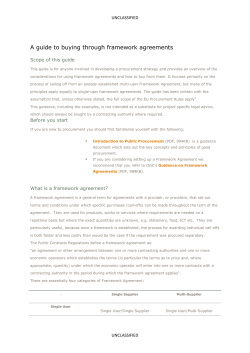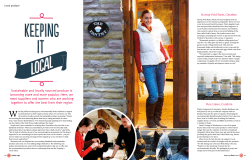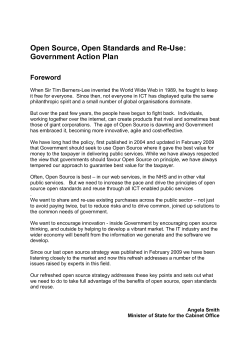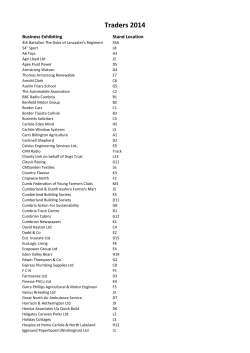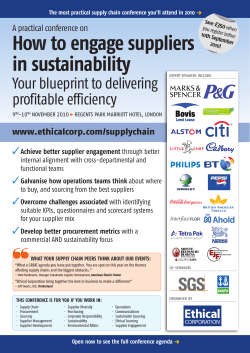
How to do business with Cumbria County Council
Cumbria County Council How to do business with Cumbria County Council A Guide for Suppliers Serving the people of Cumbria Cumbria County Council Contents 1. Introduction 2. Collaboration with suppliers 3. Council governance & how we do business 4. Issues that may affect businesses applying for opportunities 5. The tender process 6. How do we advertise Council opportunities 7. Types of tenders used by the Council 8. Approved & select lists 9. Confidentiality and Freedom of Information 10.Council Contacts 11.Useful Links 2 Page 3 Page 5 Page 6 Page 7 Page 10 Page 12 Page 13 Page 14 Page 15 Page 16 Page 17 How to do business with Cumbria County Council 1. Introduction Cumbria County Council spend approximately £330m per year with suppliers on various works, goods and services providing firms of all sizes with a wide range of commercial opportunities. We are very keen as a Council to engage with suppliers to continually improve the services delivered to the people of Cumbria. It is our aim to provide excellent procurement which secures value for money, facilitates sustainable outcomes and meets both the needs of the County and its end users, through our contracts. This Guide has been produced by the Council to: • Assist all suppliers, contractors, consultants, and providers to tender for contracts let by Cumbria County Council. • Direct suppliers and contractors where to find opportunities to supply the Council. • Explain how to apply and bid for Council contracts. This guide seeks to explain how contracts are awarded and what the Council need to consider when doing so. For award of any contract let by the Council, we generally take account of both price and quality to achieve value for money; therefore, it will not necessarily be the lowest price that wins the business. Whilst legally we obviously cannot discriminate in favour of local suppliers, we are however totally committed to supporting and encouraging local businesses to tender for our contracts. Obtaining value for money - this is an essential requirement for Cumbria County Council and cannot be achieved without the support of suppliers. To assist us with this, we want to help increase the capacity of local businesses and organisations, whether they are for example Small Medium Enterprises (SME’s), Black and Minority companies or Third Sector organisations. We want to work with suppliers to deliver services in a way that is consistent with value for money, while also wherever possible and appropriate to do so, create opportunities to generate community benefits and improve the local economy. Under the Local Government Act 1999 legislation, we must ensure we plan ahead to achieve continuous improvement through our procurement activity. We are more than happy to advise potential suppliers, and explore ways of achieving value for money, with quality goods and services at competitive prices for the Council and the people of Cumbria. Quotation/Stats: ‘Approximately 79% of our addressable spend in 2011-12 was spent with Cumbria SME’s’ So what are the benefits to becoming a supplier of the Council? The County Council is committed to using procurement to contribute to the regeneration of Cumbria. By working Quotation/Stats: with you we will continue to learn how ‘Since implementing our to make it easier for organisations to E-Procurement portal the do business with us. Chest, over 6,200 expressions of interest and tenders have The Council serve approximately been submitted by Third Sector 497,000 residents in Cumbria each and voluntary organisations’ year. Whatever the state of the economy, there are still plenty of opportunities within the public sector. Indeed, we attempt to identify our full forward pipeline of tendering opportunities on our web portal known as The Chest: www.the-Chest.org.uk This Guide is designed to provide the broad details of becoming a supplier for Cumbria County Council, whilst at the same time seeking to break down any possible barriers that businesses and organisations may have previously experienced with us. – We welcome any feedback from you… good or bad! procurement@cumbria.gov.uk As a Council, our aim is to be: • Fair • Open • Transparent • Non-discriminatory • Professional • Committed to prompt payment 3 Cumbria County Council A list of some of the typical purchases that Cumbria County Council may be involved in: Supplies and services • Building materials (plumbing, electrical etc) • Highways materials (tarmac, concrete, salt etc) • Vehicle and plant hire (diggers etc) • Street furniture • Office stationery, equipment and consumables (including I.T) • Telephone/mobile phones • Furniture • Food • Corporate and protective clothing • Vehicle purchase • Print and publicity materials and advertising • Agency staff • Courier/postal services • Car hire • Books for libraries • Banking services/cash in transit • Cleaning materials • Confidential waste 4 • • • • • • • • • • • • • • • • Insurance services Window cleaning Children’s services Adult care services Social care contracts Transport Utilities (gas, electricity, heating oils) Grounds maintenance Computer hardware and software Facilities management Removal of deceased Personal protective equipment Professional services Lamps & tubes Public Health Services Sanitary & chemical waste Works • Building renovation/maintenance • Road maintenance • Construction • Public health services Consultancy • Regeneration • Environment • Planning • Market research • Architectural/engineering • Legal services • Back office services How to do business with Cumbria County Council 2. Collaboration with suppliers Suppliers have a key role to play in assisting the Council in the delivery of services to those who live, work and visit Cumbria. Our Corporate Procurement Team are increasingly involved in collaborating with suppliers, and attend a variety of supplier and Third Sector events across the County to discuss our contracts and requirements. These events allow us to present and share details on procurement processes, future opportunities and how and where we advertise our contracts. Our team, where necessary, also offer online demonstrations of how to become a registered supplier on our E-Procurement portal, The Chest (see section 4. Electronic procurement). savings to Councils and therefore better value to Cumbrian tax payers. The creation of our “How to Do Business” booklet is an example of collaborative working arrangements. The guide is published on our website and disseminated via business and third sector networks. Our aim is to streamline the way we work and collaborate together with suppliers, to become more efficient and transparent as a Council, thereby making it much easier for suppliers to work with us. Local workshops – As part of an initiative set up by a Carlisle Solicitors firm and British Energy Coast (BEC), the procurement team have attended workshops in West Cumbria organised specifically for SME’s and local businesses to discuss how to do business with the Council. This provides opportunities for suppliers to collaborate and discuss Council procurement and how they can become involved as suppliers, and indeed work with one another. Sellafield – Cumbria County Council, alongside, Allerdale and Copeland Borough Councils, Nuclear Decommissioning Authority and BEC, regularly meet with Sellafield Ltd and its various strategic partners (suppliers) to discuss how they are delivering services through the Cumbrian local supply chain and from elsewhere. Collaborating directly with Suppliers – In specific contracts such as catering where certain products are required for our schools and care homes, we are only too happy to meet with various manufacturers and suppliers at an early stage, pre a formal procurement exercise, in order to establish what products are available in the marketplace. This allows us to suggest suitable products, which can assist suppliers to develop their product range and the products they could offer in a contract. These collaborative procurements offer greater opportunities for suppliers but within a more competitive environment, thus delivering better 5 Cumbria County Council 3. Council governance & how we do business Council and Financial Rules - Cumbria County Council, as part of its Constitutional arrangements, is required to comply with Contract and Financial Regulations, plus all relevant law that applies to procurement activity. As a result the Council has clearly defined Contract Procedure Rules within its Financial Regulations which govern how the Council will do business i.e. such as determining what process and procedures will be used when obtaining quotations and seeking tenders. European Law - All Councils must follow European law on Public Sector Procurement. Cumbria County Council, is therefore required to follow detailed procedures for all procurements above certain financial thresholds. The thresholds are governed and set by the EU Procurement regulations and are reviewed biennially. The thresholds for total contract value (i.e. over the cumulative period of the contract is in place) are currently: • Supplies and Services - £173,934 • for Works - £4,348,350 As part of our best practice, we would encourage all contractors to do so in order to help improve their next tender submission. Quotation & tender limits For procurement of all Cumbria County Council Contracts, we follow agreed internal Contract Procedure Rules (CPR’s) which determine the method of all procurement exercises. A copy of the Council’s CPR’s can be found here: http://www.cumbria.gov.uk/eLibrary/ContentInternet/536/654/1085/1087/ 4064810594.pdf All tendering and contracting are subject to the following requirements: Estimated Invitation Value/Amount Method Who may an issue invitation Who may accept an invitation £0-50,000 Minimum of 2 written quotations Appropriate Chief Officer/ Assistant Director/Budget Holder Appropriate Chief Officer/ Assistant Director These thresholds were set on 1st January 2012 and are due for review again in 2014. Details of the rules that apply to contracts at or above those thresholds are provided below: £50,000 – 100,000 Minimum of 3 written quotations Appropriate Chief Officer/ Assistant Director Appropriate Chief Officer/ Assistant Director A specific tender notice must be published in the supplement to the Official Journal of the European Union (OJEU) and if appropriate, advertised in an appropriate professional/trade journal and/or the press. Exceeding 100,000 but less than EU Formal written tender Appropriate Chief Officer/ Assistant Director Appropriate Chief Officer/ Assistant Director Above EU Threshold Formal written tender Appropriate Chief Officer/ Assistant Director plus Lead member subject to appropriate Cabinet approval Appropriate Chief Officer/ Assistant Director plus lead member subject to prior Cabinet approval Over £250,000 annual value Formal written tender Requires cabinet approval Appropriate Chief Officer/ Assistant Director plus Lead member subject to appropriate Cabinet approval Tenders must be invited in accordance with one of the agreed procedures, with minimum time-scales to ensure that interested parties are given a realistic amount of time to respond to adverts and prepare robust submissions. Once awarded, any contract by the EU Directives must period of at least 10 calendar days before contract work begins. Finally, a contract award notice must be placed in the OJEU. Unsuccessful contractors can also request a debrief session to discuss why they were unsuccessful. Note: Contract Procedure Rules: June 2013. 6 How to do business with Cumbria County Council 4. Issues that may affect businesses applying for tender/business Cumbria County Council as part of the public sector has a variety of policies that we have to comply with. Whilst we certainly do not wish to be overly bureaucratic, indeed we strive to streamline all our processes, thereby seeking to make them much more user friendly. In turn we expect our suppliers to set similar standards, for example, in areas including health and safety, environmental responsibility, sustainability, quality control procedures and equality and diversity. We would expect all suppliers to adhere to such policies which may be required when submitting quotations or tenders. At the invitation to tender stage (ITT), we may request evidence of compliance and details of your policies. These elements will form part of any tender evaluation. Where appropriate, we require suppliers to comply with all current legislation necessary for the tender they are applying for, including, for example: • • • RoHS (the restriction of the use of certain hazardous substances in electrical and electronic equipment). HWR (Hazardous Waste Regulations) and other regulations such as the WEEE (Waste Electrical and Electronic Equipment) Directive. CQC Registration (Care Quality Commission). Health & Safety Cumbria County Council takes steps to manage any health and safety risks that may arise from its work with business. The level of controls is proportionate to the risks. As a minimum, we ask businesses for a declaration of commitment to good health and safety standards. For businesses with greater health and safety risks, we will require completion of a health and safety questionnaire and we will monitor the awarded contract to ensure it is undertaken safely. Cumbria County Council encourages suppliers to seek approval/assessments of their health and safety management systems from recognised bodies and may use this as part of selection criteria. Where a business possesses current UKASAccredited third party certification or equivalent International Accreditation Body certification to OHSAS 18001, or is currently pre-qualified by a member scheme of the Safety Schemes in Procurement (SSIP) Forum, it will be easier to do business with the Council, as some of the stages that other businesses have to complete can be avoided. Environmental Responsibility We are committed to the principles of sustainability and protection of the environment. So far as reasonably practicable, this will be achieved by inclusion of environmental considerations in all procurement processes and contracts. Environmental selection criteria appropriate and proportionate to the nature of our contracts will be used in all tender processes to align with our environmental objectives. We would expect all suppliers to meet a similar level of commitment to looking after the environment to achieve our targets. Sustainability A As a Council, we continually aim, wherever possible, to achieve sustainable procurement that will save costs, reduce carbon and deliver other environmental benefits. We are committed to ensuring that the procurement of our goods services and works best fit the needs of the end users and our local communities. Our standards have been developed so that products which meet the criteria save money over the whole life of the contract, taking into consideration differing factors e.g. environmental products. Our expenditure on works, goods and services can have a huge impact economically, socially and environmentally within Cumbria. If we can minimise the risk of any adverse impact in these areas, then this will help us improve local quality of life and promote sustainable development now and for future generations. Under The Local Government Act 2000, every local authority must prepare a policy for promoting or improving the economic, social and environmental wellbeing of their area, thereby contributing to the achievement of sustainable development in the United Kingdom. We have been actively developing and refining our strategy for some years, with the aim of protecting the environment and encouraging others to do so. http://www.legislation.gov.uk/ukpga/2000/22/ contents. Further details of our Sustainability Strategy can be obtained from the following link: http://www.cumbria.gov.uk/planning-environment/ sustainability/sustainabilitystrat/Default.asp 7 Cumbria County Council Quality Control It is very important that suppliers can demonstrate recognised quality procedures to be able to ensure that high quality goods and services will be delivered and maintained. However this does not necessarily mean that you must hold the quality management system ISO 9001, for example, but we do need to know how quality is embedded across your organisation and how you expect to maintain or improve against such predetermined standards. Equality and Diversity The Council is committed to working positively to promote the values of equality and diversity and reduce inequality for all customers and employees. We aim to eliminate all forms of discrimination, promoting equality of opportunity, good community relations and cohesion throughout. We will promote equality of opportunity for all people on the grounds of gender, age, race and ethnic origin, religious beliefs, sexual orientation, disability, marital status, gender reassignment and maternity identified by the Equality Act (2010) and also the European Convention of Human Rights. Essentially we aim to ensure that our suppliers abide by the law and are working to best practice in these areas. Electronic procurement The Council seeks to use advances in technology to improve the efficiency and effectiveness of its procurement where it is cost-effective to do so and there is a clear return on investment. E-procurement enables us to undertake procurement business electronically and the Council uses a comprehensive range of tools including: • An electronic purchase to pay system, streamlining the process from requisition to payment. The system is fully integrated with the Council’s financial management system and will be used in all directorates for the requisition, purchase and payment of the majority of goods, works and services. • A portal and electronic tendering system, our portal he Chest provides an electronic system for suppliers interested in tendering opportunities. All tenders with a value in excess of £50k will be advertised on the portal. In order to improve access by SME’s and Third Sector organisations the Council encourages other public sector organisations, including the District Councils and neighbouring authorities, to use the Chest. These tools are used to identify and deliver cashable savings, improve processes and to generate improved and timely management information. Our E tendering system – the Chest Our system was created several years ago in order to bring together buyers and suppliers thereby making it easier for businesses to find out about new tendering opportunities. The Chest is a contract management system which allows us to communicate with suppliers more effectively in procurement, while providing a method of electronic tendering and reducing the traditional paper based method previously used. This method benefits suppliers by allowing them to reduce tendering costs through registering their interest online. Local Authorities in the North West including Cumbria currently spend between £6bn and £6.5bn each year on goods and services and so increase the opportunity to provide long-term stability for local businesses. 8 How to do business with Cumbria County Council The Chest The Chest is a web based system and anyone that has access to the internet and email can use it. Suppliers can register for free online to receive email updates on opportunities that match their capabilities. Register online @ www.the-Chest.org.uk Benefits of using the Chest • Flexible, allowing us and potential suppliers to receive/submit documents electronically. • Reduces production and printing of document costs. • The supplier is in control of ensuring their tender is submitted and received by the Council on time. • The system can be accessed anywhere and it is free to use. • Provides access to a range of opportunities from 46 authorities across the North West. 9 Cumbria County Council 5. The Tender Process Achieving value for money through procurement is essential and is something we continually strive to achieve. As a local authority we have agreed procedures for tenders and contracts which we must adhere to. We understand that these procedures may seem testing for some suppliers but please be assured that every stage is necessary if we are to deliver robust services and both achieve and generate efficiencies for Cumbrian taxpayers whilst mitigating against the potential risks to Cumbria County Council and its customer/end user. The following illustrates a typical procurement process within the Council. 1. Identifying the needs for procurement The Council will identify if there is a need for procurement of services, goods or works, and/or are there any other routes available. Once the business case and subsequent options appraisal is completed, the need for procurement and suitable route to the market is defined and timetabled. At this stage, we will be developing a project brief and deciding how the procurement exercise will be carried out. We will take account of possible outcomes and barriers to the procurement exercise including: • Business intelligence/market conditions, • early stakeholder engagement, • internal staff engagement. • Legislation and Council policy. 2. Seeking expressions of interest On completion of contract briefs, we will publish advertisements and contract notices, inviting suppliers to submit an expression of interest. Once received suppliers may be required to provide supporting information, either via a PreQualification Questionnaire or within the Tender pack. This will include details about their financial status, previous experience and references etc. The documentation to be completed will depend on the process used by the authority, the value and complexity of the tender/service being procured and the potential size of the market. Methods used are discussed in section 7. 10 Pre-Qualification Questionnaires (PQQ): Restricted Procedure If the procurement route chosen requires completion of a PQQ, this is known as a two stage restricted process. Responses from completed questionnaires are used to assess whether the supplier can meet the requirements for that particular contract. Tender documentation is then sent to the short listed suppliers. In a single stage process (known as an Open Procedure) a questionnaire is sent with the tender documents and is used as part of the technical and financial appraisal. 3. Inviting tenders The Council can invite suppliers to provide tenders from either an advertisement or from those who have successfully passed the expression of interest stage. E.g. they have completed a successful PQQ. If you receive an invitation to tender, you are being invited to make an offer. Within the tender pack there will be as a minimum: • A Letter of Invitation outlining details of all the documents in the pack and the closing date for return of tenders. • Terms of Contract. • Specification. • Pricing Schedule. • Evaluation Criteria used to judge the responses. Specific requirements will apply to individual procurements as will the level of detail and information to be supplied. The main methods used for tendering are the open and restricted procedures. Please see section 7 which discusses this in more detail. 4. Evaluating tenders The Council evaluates tender submissions against set standards (or criteria) relating to how the tenderer proposes to deliver the services (quality) and the cost of the services (value for money) This criterion is outlined in each tender pack sent out and allows the Council to provide fair and transparent evaluations of tenders ensuring an objective assessment is achieved and each submission is judged on its own merit. How to do business with Cumbria County Council 5. Awarding the contract Common reasons for non acceptance of PQQ’s/ tenders The Council shall as soon as possible inform candidates and tenderers of decisions reached concerning the conclusion of and the award of the contract. On most occasions the Council awards the contract to the supplier whose bid offers the Most Economically Advantageous Tender (MEAT). Contracts with a value in excess of £250,000 will be subject to a decision by the County Council’s Cabinet. • In most cases the Council will Inform: • The unsuccessful candidate of why they weren’t selected and areas they could have improved their submissions, • Tenderers of the successful tenderer selected. • • • 6. Performance and management of the contract The Contractor performs the contract and the Council manages it, checking and monitoring the contractor’s performance throughout. Useful information to consider at each stage of the tender process Potential bidders can increase their chances of being successful in their applications to carry out work for us if they pay attention to the following aspects of the process. • • • • • • • • • Uncompetitive – failure to submit the most cost effective, best value offer in accordance with the evaluation criteria. Not quoting a price for the specified product (and the alternative submitted is not the equivalent). Not supplying samples of products when requested. Not supplying samples of management information, reports or COSHH data sheets with the tender documents; and Unsatisfactory references (performance) or financial history. Submission of an alternative bid without prior agreement. Bids submitted after the tender deadline. Supporting evidence may be requested where applicable. In certain circumstances, suppliers could be asked to undertake a presentation/ interview with members of the evaluation panel but this will be made known in advance through the tender documentation. Should there ever be any doubts or queries during the tendering process, suppliers should always ask a question using the correct procedure. A copy of the responses will also be sent to all other suppliers participating in the tender process. This allows complete transparency and two way communications for clarification whilst protecting parties involved from any accusations of collusion. Keep an eye on the Councils’ web sites, the Official Journal of the EU and the local and trade press for tender notices. Study the entire tender document carefully ensuring you meet all the requirements. Ensure you supply all the information and details asked for in the required format, answering the questions asked and not the questions you wished were asked. Ensure your submission is returned before the deadline, as tenders are not accepted if they arrive late - even if they were posted before the deadline. Contact the tendering authority if you require any further information. Check your submission to ensure that you have included/attached everything you intended to. Do not attach promotional information that has no relevance to the tender being applied for. 11 Cumbria County Council 6. How do we advertise Council opportunities? We invite suppliers to express interest or to tender in response to advertisements placed. Tender advertisements, where appropriate, may be placed in local and regional newspapers and/or trade journals and our E Procurement portal, The Chest. Examples of where advertisements are placed include: Cumbria County Council E - Procurement portal ‘The Chest’ www.the-Chest.org.uk Local Newspapers The Cumberland News The Times & Star The Westmorland Gazette Cumberland & Westmorland Herald Official Journal of the European Union www.ojeu.eu Trade and/or Professional Journals The Guardian Surveyor Magazine - http://www.surveyormagazine.com/ More and more we are advertising our contract opportunities on our E- Procurement portal, the Chest. At present six authorities in Cumbria (Cumbria County Council, Allerdale, Barrow, Copeland, Lake District National Park and South Lakeland District Councils) are advertising through the portal regularly, with other authorities committed to following suit in the near future (See section 4. Electronic Procurement). Using the Chest has proved to be an effective method of procuring contracts for the County Council. Electronic procurement means that the tender documents can be downloaded and completed by suppliers, and then returned electronically 12 Details of all of our contracts can also be viewed on the Councils Contracts Register available on the Council website. http://www.cumbria.gov.uk/scprocurement/contractsregister/ contractsregister.asp How to do business with Cumbria County Council 7. Types of tender procedures used by the Council The tender process used by the Council will depend on the value and complexity of the tender/service being procured and the potential size of the market. There are a number of different methods detailed below, the first two being the most commonly used: • • • Open Procedure – This allows suppliers that have responded to a public notice to tender without prior selection. Open Procedures can result in a high volume of responses meaning it is usually used when the size of the market is known. This process lasts for 52 days. Restricted Procedure – This procedure is a two stage process that runs for a period of 37 days, with the first stage in the form of a PQQ. Suppliers will be short listed to receive tenders once they have passed the preselection criteria. This method is normally used where there is no framework in place for the type of goods or services required, or for contracts above the EU procurement threshold. Accelerated - An accelerated procedure may be used as part of the restricted procedure where there is urgency. Suppliers cannot be allowed the periods normally required under restricted procedures. The use of an accelerated procedure is limited to the types and quantities of products which it can be shown are urgently required. Other products must be supplied under a normal procedure. An accelerated procedure runs for a period of 15 days. • Negotiated – This procedure is used when the terms of the contract can be negotiated with one or more providers but it will still be subjected to competition. This procedure is only used in limited circumstances which are clearly defined by the EU procurement directives and lasts for a period of 37 days. • Competitive Dialogue – Is used to negotiate the terms of a contract with one or more suppliers selected by it. It is used for complex contracts where the authority is not objectively able to define the technical means capable of satisfying its needs or objectives, or specify either the legal or financial make up of a project. As a general rule there must be a call for competition. The period for a competitive dialogue is 37 days. • E-auctions - Also referred to as reverse auctions in which suppliers offer progressively lower bids in order to win a contract. They are conducted online and allow bidders to see the most competitive bid, and to re-bid in response. Bidders are all pre-qualified and quality scores are typically built into the auction process as bid weightings. Bidding may last a few minutes, or many hours. • Frameworks – Are used to set up an arrangement with one or more suppliers on the understanding that the Council may call on suppliers to provide works, supplies or services as and when required. Frameworks do not guarantee work for suppliers and tenderers are still subject to competition as part of that framework. Once suppliers are successfully selected to form part of a framework, they are usually required to complete mini competitions with other suppliers on the framework to ensure best value is achieved. Timescales vary for each process and are dependent on whether the EU threshold is achieved. The dates are clearly published when the contract is advertised and must be adhered to by both the Council and tenderers. The Procurement cycle 13 Cumbria County Council 8. Approved & select lists Use of other Local Authority Framework agreements All public authorities are encouraged to use Framework Agreements where they exist. This is when an organisation has completed a tender process doing the financial and technical appraisals on suppliers and agreeing the terms, conditions and pricing structure of delivering specific goods, services or outcomes. At the outset the tenderers will have an indication of the potential value of the agreement and the organisations that may choose to use it. They can be national, regional or sub regional and organisations will need to check these first before carrying out an individual procurement process. Frameworks are sometimes described or known as approved or accredited suppliers’ lists. The Council is participates in various frameworks which we use for goods or services, including; Yorkshire Purchasing Organisation (YPO) for Utilities and Government Procurement Service/YPO for a range of other services. Where we use frameworks for procuring goods, works or services, there is no requirement to advertise this via our E-Procurement portal. Please contact our procurement department for details of other frameworks we are part of. Frameworks we procure Frameworks are used for Cumbria County Council for certain contracts as discussed in section 7. Suppliers that wish to be included on a framework will only be considered when the framework is advertised for renewal. Those wishing to apply to be placed on a particular framework should respond to the advertisement which will state the requirements and request expressions of interest. 14 Dynamic Purchasing Systems (DPS) A DPS is a completely electronic process for purchasing commonly used goods, services and works. (off the shelf purchases). The system can only be established using the rules of the Open Tender Procedure and must be open throughout its duration for the admission of any provider which satisfies the selection criteria and submits an indicative tender which complies with the service specification and should be limited to a maximum duration of 4 years. How to do business with Cumbria County Council 9. Confidentiality and Freedom of Information Cumbria County Council along with all other authorities is subject to the provisions of the Freedom of Information Act (2000). It is important that suppliers are aware that any information submitted to the Council in relation to a Pre-Qualification or Tender exercises may be subject to the provisions of this Act. The legislation confirms that any third party may request information on records relating to a tendering procedure. However certain records may be exempt from the provisions of the Act on the grounds of Confidentiality or Commercial Sensitivity (unless to disclose this information would be in the best interests of the public). Tenderers are normally requested to indicate, with supporting reasons, any information included with their tenders that they wish to be regarded as confidential. In response to a FOIA request, the relevant material will be examined in the light of exemptions provided under the Act. We will make every attempt to consult tenderers before information of this type is provided however cannot restrict ourselves as a Council where we are required to disclose information as part of the Act. As a result, we cannot guarantee that any information supplied as part of a pre-qualification or tendering exercise will remain confidential. 15 Cumbria County Council 10. Council contacts Cumbria County Council Procurement Contacts If you would like further information please contact our procurement department Research, Development & Information Officer Corrina McCleary-Hill corrina.mccleary-hill@cumbria.gov.uk Category Manager Debbie Heard 01228 221741 debbie.heard@cumbria.gov.uk Category Manager Nicola Bell 01228 221742 nicola.bell@cumbria.gov.uk Procurement Projects Manager Abi Lindsay 01228 221745 abi.lindsay@cumbria.gov.uk Procurement Projects Manager Mike Farren 01228 221745 mike.farren@cumbria.gov.uk Alternatively you can email us at: procurement@cumbria.gov.uk 16 Other Local Council Procurement Contacts Allerdale Borough Council www.allerdale.gov.uk Barbara Watson 01900 702521 barbara.watson@allerdale.gov.uk Barrow Borough Council www.barrowbc.gov.uk Richard Hennah 01229 876325 rhennah@barrowbc.gov.uk Carlisle City Council www.carlisle.gov.uk Malcolm Mark 01228 817353 malcolmma@carlisle.gov.uk www.carlisle.gov.uk Copeland Borough Council www.copelandbc.gov.uk Jennifer Noble 01228 221746 jennifer.noble@cumbria.gov.uk Eden District Council www.eden.gov.uk Clive Howey 01768 212213 clive.howey@eden.gov.uk South Lakeland District Council South Lakeland District Council www.southlakeland.gov.uk Helen Smith 01539 793147 h.smith@southlakeland.gov.uk Lake District National Park Authority www.lakedistrict.gov.uk Neil Solender 01539 792899 neil.solender@lake-district.gov.uk How to do business with Cumbria County Council 11. Useful links Cumbria County Council www.cumbria.gov.uk Cumbria County Council Procurement Strategy http://www.cumbria.gov.uk/scprocurement/ ProcurementGuidance/strategy.asp The Northwest e-tendering portal www.the-Chest.org.uk The Northwest Contracts Register http://thevault.nwce.gov.uk The Official Journal of the European Union www.ojeu.eu The Government’s procurement website provided by the Cabinet Office http://www.cabinetoffice.gov.uk/ Cumbria Compact - The Compact is an agreement which lists a number of principles on how a statutory sector organisation (such as the Council or the NHS) should do business with the third sector (voluntary, charity or community organisations) http://www.cumbria.gov.uk/community/third_ sector/compact.asp Cumbria County Council Economic Development Department - The team provide a range of functions with the overall aim of promoting thriving communities by supporting the strategic development of Cumbria’s economy. http://www.cumbria.gov.uk/business/ecodev/ home.asp Social Value Act – This is an Act to require public authorities to have regard to economic, social and environmental well-being in connection with public services contracts; and for connected purposes http://www.legislation.gov.uk/ukpga/2012/3/ enacted GOV.UK - Providing independent and impartial advice and support for both new and existing businesses https://www.gov.uk/ Britain’s Energy Coast Cumbria - The agency’s role is to help create jobs in West Cumbria by helping new businesses start and grow, by assisting local companies to expand and by facilitating inward investment into the area. www.britainsenergycoast.co.uk Sellafield Ltd – Sellafield is responsible for safely delivering decommissioning, reprocessing and nuclear waste management activities on behalf of the Nuclear Decommissioning Authority. Their procurement aim is to acquire goods and services at best value, ensuring a fair and reasonable involvement of stakeholders, the supply chain and the local community. http://www.sellafieldsites.com/suppliers/ Cumbria Social Enterprise - Brings partnership, provides free specialist business support and mentoring, training and networking events and advocates on behalf of the social enterprise and cooperative sector in Cumbria. www.socialenterpriseincumbria.org Cumbria Chambers of Commerce – The commerce represents Cumbrian business both SME’s and larger corporate organisations. The chamber assists business to grow and expand providing business support and networking opportunities. www.cumbriachamber.co.uk/ Furness Enterprise - Provides total business support service to new and existing businesses within the Barrow in Furness travel to work area. www.furnessenterprise.co.uk Cumbria Rural Enterprise Agency - Gives business and farm support services for start up and existing businesses and farms in Eden and South Lakeland. www.crea.co.uk CCCJ/N.18193 (These links are by no means exhaustive but are merely illustrative) A number of websites provide practical information on everything from EU procurement to public sector tendering information. 17
© Copyright 2025



